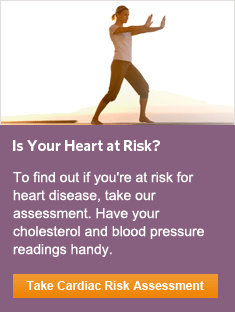Getting to Know Your Risks
It's important to recognize your risk factors and understand what you can do to eliminate or modify them. For example, you can stop smoking, exercise routinely, eat a healthy diet, and, with the help of your doctor, manage high blood pressure, cholesterol, and diabetes. Some other risk factors can't be modified, such as heredity and age.
Learn more about the risk factors for heart disease:
Smoking – When you stop smoking, your risk of cardiovascular disease decreases significantly within a year.
Cholesterol – Even if you have normal cholesterol levels, a modest reduction can decrease risk.
Blood pressure – Sustained high blood pressure increases your risk of heart disease.
Diabetes – Diabetes multiplies the risk of coronary artery disease five times in women and two times in men.
Exercise – Regular exercise improves cardiovascular function and alleviates many other risk factors.
Diet and nutrition – Choosing heart-healthy foods on a daily basis helps protect against heart disease.
Stress – Stress management techniques can reduce the effects of a high-pressure work environment or living situation.
Other risk factors – Additional factors may contribute to risk, including C-reactive protein, age, family history, metabolic syndrome and other emerging risk factors.
